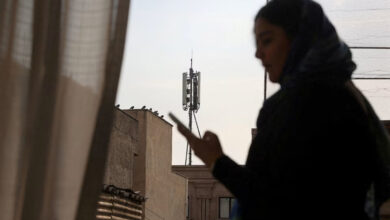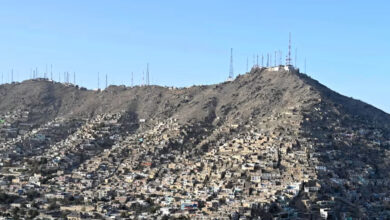Every evening, millions of Egyptians are plastered to their television screens, surfing through dozens of privately-owned satellite channels that broadcast a plethora of news talk shows. But in an abrupt move last week, one show was banned and the other lost its prime host shocking journalists and human rights advocates who fear that the margins of freedom of speech may be scaled back ahead of parliamentary elections scheduled for November.
Amr Adeeb’s popular talk show, "Al-Qahira al-Youm" ("Cairo Today"), was barred from broadcasting from state-owned studios in 6 October City. According to government spokesmen, the show was halted because the production company, Orbit, had not paid its dues.
However, the show’s co-host, Ahmed Moussa, said in a subsequent televised interview that Orbit was willing to pay all its back dues. He went on to attribute the ban to "malice" on the part of the government.
“Someone wants to crush freedom of expression and opinion,” Moussa declared when the ban was announced.
Meanwhile, it was also announced that Ibrahim Eissa, an outspoken critic of the regime of President Hosni Mubarak, had departed from the privately-owned ON TV, on which he had co-hosted the popular talk show “Baladna Belmasri." According to a press release issued by the channel, the 45-year-old journalist had quit the show voluntarily in order to give his full attention to independent daily Al-Dustour, of which he has been the editor-in-chief since 2005.
For his part, program producer Omar Shoeb denied that Eissa had been subject to any pressure to resign by the management. He also asserted that the show would maintain the same editorial policy.
"There will be no editorial changes whatsoever. We will continue as strong as we started," said Shoeb, reiterating the channels' earlier account of Eissa's departure.
Eissa, however, has neither confirmed nor denied the channel's claims and has refrained from providing further details. As of press time, Al-Masry Al-Youm was unable to reach the journalist for comment.
According to Gamal Eid, executive director of the Cairo-based Arab Network for Human Rights Information, the incident is hardly unprecedented.
“This is not a new practice by the state,” he said. ”The only difference this time around is that it has involved two very well-known people, and at the same time.”
The moves, Eid went on to assert, were meant to “pave the way for upcoming parliamentary elections in order that they can be rigged without having anyone talk about it.”
The elections will be held amid calls by opposition groups to boycott the voting, which will not be subject to any oversight by the judiciary. Independent presidential hopeful Mohamed ElBaradei, for his part, has consistently warned that this year’s poll would likely be marred by vote rigging and violence so as to maintain the ruling National Democratic Party (NDP)'s overwhelming majority in the national assembly.
The former head of the UN atomic watchdog has argued that whoever participated in the poll–either as voter or candidate–would be effectively challenging the will of public. Major opposition parties and the Muslim Brotherhood opposition group, however, have rejected ElBaradei's calls for a boycott.
NDP officials, meanwhile, have made repeated promises of a fair election–promises that many observers dismiss as empty.
“How can anyone believe talk about electoral integrity when such television shows are being banned?” asked prominent newspaper columnist Soliman Gouda, who hosts his own political talk show on the privately-owned Dream satellite network. “Everything that's being said about the integrity of elections is just words. Nothing will be seen on the ground.”
Within the last five years, private media has proven itself a force to be reckoned with, frequently exposing government corruption and human rights violations and discussing highly sensitive issues such as the question of presidential succession.
According to Gouda, the plethora of TV talk shows now emanating from privately-owned stations have served to “raise the level of people’s awareness regarding their rights and public issues."
Unlike government-owned media, such channels are not subject to the whims of the state–at least not officially. Most, however, are owned by high-profile Egyptian businessmen, many of whom are either NDP members or rely on financing from state-run banks.
Some of these private media barons admit that they still remain subject to government diktats.
In an interview with Al-Masry Al-Youm earlier this summer, Dream TV owner Ahmed Bahgat–whose news channel attracts millions of Egyptian viewers–said that he would "shut Dream down" if asked to do so by the state.
“What else could we do? Would we challenge the state?” asked Bahgat, who is currently saddled with an LE3 billion debt to the National Bank of Egypt.
In another interview with Al-Masry Al-Youm, Hassan Rateb, owner of the Al-Mehwar television channel, said that he never hired anyone without receiving "clearance" from the state security apparatus.
According to Eid, such businessmen are driven by “a commercial mentality that cares more about money than principles.” He went on to cite past incidents in which the management of privately-owned channels had given in to state pressure to have certain shows banned.
“No businessman has dared to disobey the state, because this might not only cause him to lose money but could also lead to him being driven out of the country,” said Eid.
The targeting of Adeeb’s show in particular has raised eyebrows, since the latter is commonly perceived as being relatively soft on the state. This leniency was most explicitly illustrated in the show’s recent decision to hire Moussa, who had been managing editor of state-run daily Al-Ahram, to co-host the show.
For Eid, the targeting of even relatively soft-spoken critics reveals the regime's “despotic” nature.
“The fact that there are no clear and fixed red lines in the media can turn state friends into enemies at any moment,” he said. “This is typical of despotic regimes that have weak institutions and a blurred vision.”
Gouda, however, said that Al-Qahira Al-Youm does not necessarily toe the government line.
“Adeeb, with his cynical style, could be more provocative to the state more than other talk show presenters,” he said. “Therefore, it was only natural that he was targeted.”
In any event, the ban comes at a critical juncture in Egypian politics. Given Mubarak’s shaky health condition, there is a growing sense of anticipation about who will succeed the 82-year-old president. In the meantime, opposition groups have sought to build momentum against the re-election of Mubarak and the possible nomination of his son for a presidential poll slated for 2011.
The opposition’s staunch views are closely monitored by the independent local press and widely diffused by private television stations.
“I believe the ceiling for freedom of expression will be lowered,” said Gouda. “The state will not want to fight on several fronts at once. It is already facing the opposition, young Facebook activists, ElBaradei, and foreign pressures."
"The least it can do is silence the talk-show front, which has become more outspoken in recent years," he added.




